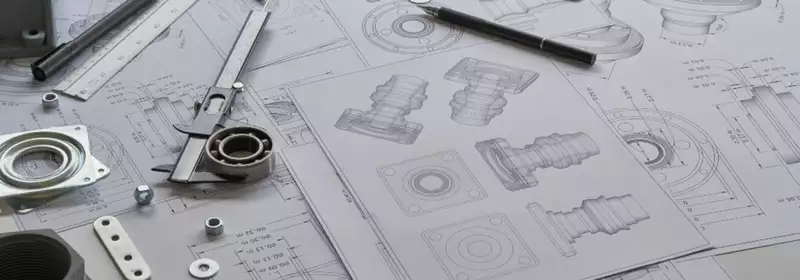Engineering is a broad field of study, which combines the application of maths and science to design, build and test structures.
From the cars we drive to the device you’re reading this blog on, engineering surrounds us.
Engineering is not only useful to the modern world, it’s intrinsic to the way we live. As such, it is one of the most important and in-demand careers in the world.
Despite this, there is a significant skills shortage in the engineering workforce.
This is partly due to sexism in education, discouraging girls from pursuing STEM careers. This is gradually being rectified but we won’t see the benefits for years.
Coupled with the notion that it is a difficult industry to break into, there are many reasons why talented individuals feel that they can’t pursue an engineering career.
In fact, an estimated 1.8 million new engineers are needed by 2025 to support the industry.
However, engineering isn’t just for men or A* students. It’s a field that directly influences how we all live and work. Therefore, engineering needs a diverse mix of people, from a range of backgrounds, if it is to continue to shape our world for the better.
So, if you're passionate about engineering but have held your professional development back, now's the perfect time to achieve the career you’ve always wanted.
Qualifying as an Engineer
Engineering requires a specialised skillset, which means that you need specific qualifications to become an engineer. You’ll need the right experience too.
To qualify in engineering, you will need to study a 3-year Bachelor of Engineering degree (BEng) or a 4-year Master of Engineering degree (MEng) at university.
To access undergraduate study, most universities ask you to have 5 GCSEs at grade 4/C or above, including English language, maths and science. 2 A Levels in maths and physics are essential, plus an additional A Level in either design technology, maths or chemistry.
The A Level grades you need to enrol on an engineering degree vary for each university. Typically, universities require you to have achieved AAA in your A Levels; however, entry requirements range from BBC to A*A*A*.
As engineering degrees are highly competitive, grades aren't the only things that matter when it comes to securing your university place.
Relevant work experience is also important. Having experience in engineering or a related field will help make your application stand out. It will also demonstrate your passion and commitment to pursuing an engineering career.
As engineering is a hands-on, practical subject, you can also enter the industry via an apprenticeship. Apprenticeships offer you on-the-job training whilst you work towards a vocational qualification.
Most employers ask for a 5 GCSEs, including English, maths, science and IT, at grade C or above. However, if want to complete a higher apprenticeship, you will also need to have A Levels or an equivalent Level 3 qualification to apply.
This could be the ideal route for you if you don’t want to go to university or are looking to start your career in a certain role, in a specific company.
If you haven’t got a specific company in-mind, studying an engineering degree will keep your options open for the future.

Choosing Your Degree
Unlike degrees for other professions that allow you to specialise at the end of your studies, engineering degrees are tailored to suit your interests from the very start.
Therefore, the engineering degree you choose will influence the type of engineering work you can apply for in the future. So, it’s important to know which area of engineering you want to go into before you apply.
Most engineering degrees will focus on one of the following areas:
Chemical Engineering
Chemical engineering combines the principles of chemistry, physics, biology and maths to create new products from raw materials. These products range from the clothes we wear to the food we consume. Chemical engineers are responsible for the development of new or adapted materials. They also assist in the design, manufacture and transformation of products, whilst keeping sustainability and the world’s resources in mind.
Civil Engineering
From bridges, roads and railways to schools and hospitals, civil engineering is all about the infrastructure around us. As such, civil engineers help to build and connect the world we live, through planning and design. They also maintain the infrastructure that we depend on – such as our energy and water supplies and flood defences – and adapt systems in response to challenges posed by population growth and climate change.
Mechanical Engineering
This engineering specialism focuses on the development and implementation of moving parts into a variety of products. This may be a mechanical heart for use in medicine or a specialised piece of machinery for a factory. Whatever the product, mechanical engineers are responsible for designing and manufacturing it in compliance with specific safety standards. As such, they are involved in every stage of a product’s life, from research to implementation.

Electronic and Electrical Engineering
Primarily focused on electricity, electronic and electric engineering revolves around the electronic devices and technology we use every day. As a result, this area of engineering covers everything from telecommunications and aerospace to broadcasting, computer engineering and robotics. Electrical engineers are therefore at the forefront of technological and electrical advancements.
Minerals and Materials Engineering
This area strongly mixes science with engineering. Mineral engineers have a strong understanding of geology, rock mechanics, surveying and materials such as polymers, textiles and ceramics. They use this knowledge to develop new materials and identify how existing materials can be improved to make them stronger, cheaper and better suited to their environment.
General Engineering
This area of engineering, as the name suggests, is far broader than the rest. It explores how science and technology can be used to design, develop, build and maintain a variety of engines, structures and machines. Therefore, this area of engineering encompasses the subcategories that the industry relies on. These include architectural, agricultural and computer engineering. Because of this, general engineers have a more varied skillset and will understand how to apply a range of engineering principles to solve real-world issues.

If you would like to become an engineer but aren’t sure which area you would like to work in, a general engineering degree would be ideal.
General engineering degrees will leave you with a well-rounded knowledge base that you can apply to a range of industries. This allows you to qualify as an engineer whilst keeping your career options open.
Whichever degree you study, most programmes offer the opportunity to put your skills and expertise into practice with a year in industry. This will give you valuable experience, which will help you hit the ground running when you enter your first graduate role.
Becoming an Engineer Without A Levels
Although A Levels form the requirements for most engineering degree programmes, they aren’t the only route you can take to get into university.
If you haven’t got the right A Levels to apply, an online Access to Higher Education Diploma can help you go to university and begin your engineering training.
The Access to HE Diploma is a recognised Level 3 A Level alternative. It is therefore accepted by universities across the UK.
Designed with your future in mind, the Access to HE Diploma (Engineering) will prepare you for undergraduate study without traditional qualifications, from your own home.
It will teach you the underlying principles of engineering and equip you with the skills to thrive on a variety of engineering degrees.
As the diploma is a home-study programme, you will have the freedom to study at your own pace, around your commitments. This means that you could complete your studies and be ready to apply for university within a year.
Traditional A Level programmes take up 2 years to complete. So, your Access to HE Diploma if the ideal solution for you if you want to start your engineering training as quickly as possible without going back to school.
Plus, with just a C/4 grade GCSE in English and maths required to enrol, the Access to HE Diploma provides an accessible route into engineering for those without an A* academic background.
You can find out more about this course here.

Your Career as an Engineer
Your future in engineering will be moulded by your undergraduate degree.
However, no matter which area of engineering you specialise in, you can look forward to a career that will literally shape the world around you.
You could find yourself developing the latest electronic car technology to reduce carbon emissions, building a spacecraft or even redesigning our cities’ infrastructure to improve its efficiency and sustainability.
As an engineer, you will possess strong problem-solving and analytic skills, which are desirable to employers in a range of sectors. These include:
- Environment and conservation
- Local government
- Manufacturing
- Education and research
- Healthcare
As a newly qualified engineer, you will work in a technical role. However, with experience, you will have the opportunity to move into managerial roles, where you’ll be responsible for strategy and leading a team.
To progress your career even further, you can gain Chartered Engineer status. For this, you will need to study a Master of Engineering (MEng) degree or an Engineering Doctorate (EngD) that has been accredited by a professional engineering body.
Being a Chartered Engineer (CEng) isn’t required for a successful career in engineering. However, it is essential if you wish to access top industry positions, including engineering director and chief engineer.
Ready to shape the world? Find out how you can start your career as an engineer with learndirect today! Call us on 01202 006 464 to speak to one of our career advisors or click below to enrol on your Access to Higher Education Diploma (Engineering).



















